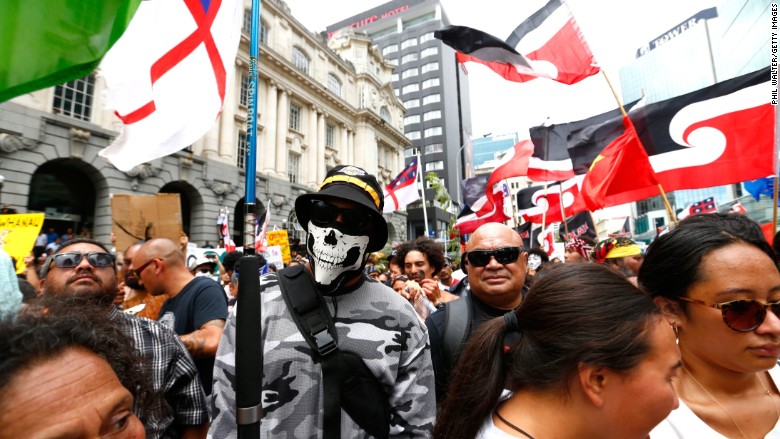
Anti-TPP protesters in Auckland.
Amid angry protests in the streets, Pacific rim countries signed the controversial Trans-Pacific Partnership (TPP) trade deal on February 4 in New Zealand's capital Auckland.
The TPP, which grants corporations huge powers over sovereign governments, still needs to be approved by the parliaments of signatory nations — Australia, Brunei, Canada, Chile, Japan, Malaysia, Mexico, New Zealand, Peru, Singapore, the United States and Vietnam. The 12 governments have two years to ratify the deal.
Amid angry protests in the streets, Pacific rim countries signed the controversial Trans-Pacific Partnership (TPP) trade deal on February 4 in New Zealand's capital Auckland.
The TPP, which grants corporations huge powers over sovereign governments, still needs to be approved by the parliaments of signatory nations — Australia, Brunei, Canada, Chile, Japan, Malaysia, Mexico, New Zealand, Peru, Singapore, the United States and Vietnam. The 12 governments have two years to ratify the deal.
New Zealand Greens MP Sue Bradford was among 1500-2000 spiritied protesters who partially blocked access to the Auckland Harbour Bridge from the city.
A heavy police presence was on the streets of central Auckland to handle the protests. Meanwhile, more than 1000 people were gathered outside the SkyCity Centre where the signing took place.
One of the marchers, militant Maori activist and former Mana Movement MP Hone Harawira, said there was no choice but to be keep battling to prevent the deal from being approved by parliament, SBS.com.au said that day. “We can't afford not to send a signal on this day, the day of the signing, and keep sending it day in and day out.”
The picturesque city of Dunedin was also the venue for a spirited rally on January 30, ahead of the signing of the TPP, Green Left Weekly>'s Margaret Allum reported. Groups represented at the rally included unionists such as the meatworkers union, International Socialist Organisation, Green party, Labour and SAFE (animal rights), Seniors against the TPPA, environmental and anarchist groups.

Placards at Dunedin. Photo by Margaret Allum.
“The TPP signing today is theatre, and the actors are not very convincing,” said Evan Greer of the US-based advocacy group Fight for the Future in a statement on February 3. “Everyone knows the real fight will be in [the US] Congress, where this unpopular and anti-democratic deal faces fierce opposition from both sides of the aisle.”
Fight for the Future, which has actively campaigned against the TPP, said a big push to ramp up protest against the trade deal is in the works to block the TPP from being ratified now that it is signed.
“Recent polls show that the more people learn about the TPP, the less they like it,” added Greer.
Other groups have slammed the White House for relying on “Republican friendly organisations” to get the deal through Congress, highlighting just how regressive the TPP is.
“It's ironic that even the administration now admits that passage of TPP relies on the support and work of some of the most vehement opponents of real progressive policies,” Shane Larson, legislative director at the Communications Workers of America, said in a statement after the deal was signed.
“The lack of support from Democrats and the progressive movement clearly demonstrates the emptiness of claims that the TPP is a 'progressive' trade agreement.”
Democratic presidential candidate Bernie Sanders tweeted that the TPP continues the “disastrous trade policies that have devastated manufacturing cities and towns” across the US.
Campaigners have long raised the alarm that the TPP is an anti-democratic deal that will further balloon corporate power at the expense of labour rights, food security, public health, human rights and the environment.
International president of the United Steelworkers Leo Gerard said groups in the US would expand their protests against the TPP to “make it perfectly clear that this proposed agreement is just like all the previous ones that have destroyed millions of family-supporting jobs, while shuttering plants and devastating communities”.
The TPP has been criticised for exacerbating the worst impacts of free trade enshrined in current agreements, such as the North American Free Trade Agreement, expanding corporations' rights to level lawsuits against countries and locking the world into a future dominated by fossil fuels.
Friends of the Earth president Erich Pica said the TPP will add “new provisions for dirty energy companies that care little about the existential threat posed by climate change”. Pica also added that the TPP will override agreements reached at COP21 in Paris in December, further undermining largely unbinding commitments to tackling the climate crisis.
A United Nations independent human rights expert, who urged world leaders not to sign the TPP, has said that if the deal is ratified in participating countries and comes into force, it should be challenged in the International Court of Justice as a “flawed” deal devoid of human rights guarantees.
But ratification is not certain, and many advocacy groups have pledged to continue to vehemently oppose the deal.
[Mostly compiled from TeleSUR English.]
Like the article? Subscribe to Green Left now! You can also like us on Facebook and follow us on Twitter.